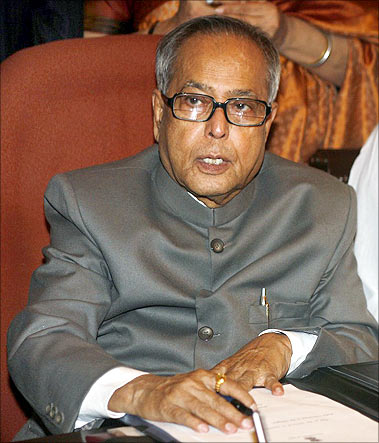
Liquidity movement is mirroring this new shift in confidence. While the jury is still out there as to how much long can this change in perception prevail, domestic concerns in India have certainly not helped.
As the state withdrew increasingly in the last decade, with no big-bang reforms coming and the economy moving almost on autopilot, it was but natural for the Budget to have become a non-event and a mere accounting exercise.
In the current backdrop, however, the Budget has suddenly resurrected hopes of giving direction to the market.
All proposals and policy measures in the forthcoming Budget may best be summed up as efforts to improve the sustainability of growth, while keeping an eye on state assembly elections.
Specific objectives are likely to be lowering inflation and deficits fiscal and current account. While no major overhaul of taxes are expected, if the government has the intention and/or confidence to bring in GST and DTC, fiscal deficits for FY11 and FY12 may bring in positive surprises albeit cosmetically.
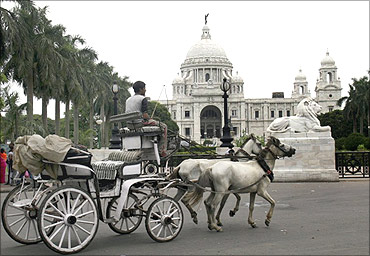
Overall, any sense of vigour in leadership and serious intent in taking reforms forward from the budgetary provisions and policy announcements is likely to be what the markets would be looking for.
So, will it be different this time around? If the past is any guidance, it would be prudent to anchor our expectations low, and then hope for some pleasant surprises, maybe...
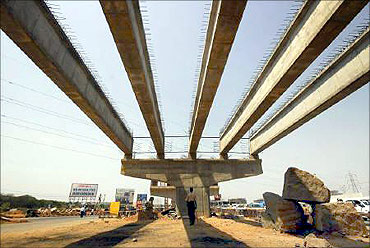
These objectives would imply policy measures aimed at improving the potential growth of the economy by investing hugely in capacity building both physical as well as social infrastructure. And this should be the broad guiding principle of the Budget 2011.
Opportunity cost of letting inflationary expectations remaining elevated: Policy stimulus monetary as well as fiscal were warranted in FY10, when the global economy was looking at the possibility of a recession, and Indian economic growth was precariously expected to go below 6 per cent mark.
However, continuing with accommodative monetary and fiscal policies in FY11, when growth was touching 9 per cent was bound to keep inflation at an elevated level.
Indeed, it has never happened since liberalisation was adopted in 1991 that food inflation has remained at such elevated levels for more than two years now.
The opportunity cost of allowing inflationary expectations to remain elevated in the process of pushing growth beyond the potential rate, given the existing capacities and investment levels, risks future growth by a much larger amount.

However, the idea of pro-poor policies has got associated with higher spending on social sectors and subsidies due to political economic realities, making it inconsistent with the objective of improving sustainability of growth.
All finance ministers are tempted to play around this myopic vision, at the cost of sustainable growth in the longer term. And it is unlikely to be different this year, with the state assembly elections due in May.
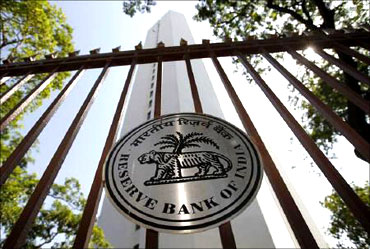
The RBI has been left alone to fight inflation by tightening policy rates, while nothing much has been done on the fiscal policy front that continues to be accommodative.
Serious questions are bound to arise on the macroeconomic judgement of the policy makers, when inflation remains persistently high for such a long period of time.
It is high time that the remaining stimulus provided in terms of excise and other duty incentives are withdrawn in the ensuing budget. Real policy rates continue to be negative. Investments and capacity additions are not gaining momentum more because of lack of confidence and less because of rising interest rates.
Continuing stimulus for more than two years, along with social programmes akin to cash-transfers, may keep the aggregate demand buoyant, but investments and supply augmentation falling short is bound to create demand-supply mismatch.
The Budget, in appreciation of these transformation changes, should significantly increase outlays for investment in agriculture and infrastructure.
A larger share of public expenditure should now be directed towards R&D in agriculture and irrigation facilities. Even FDI in retail may be allowed, with the condition that a higher proportion of total investment goes into logistics and storage and other backward integration activities.

However, this sharp drop of 1.8 per cent point from 6.8 per cent in FY10 has been made possible due to the one-off revenue coming from 3G/BWA spectrum sale, and of course the inflated nominal GDP in the denominator.
If we take away the 3G bounty, the deficit increases to 5.6 per cent. The likely BE for FY12 at 4.5 per cent thus seems to be a Herculean task, with no diesel price deregulation in sight and the much-hyped Food Security Bill likely to cost an additional Rs. 250 billion to Rs. 350 billion, on top of the existing food subsidy of Rs. 570 billion, depending on whose recommendations are implemented NAC or EAC.

As such, not much may be expected on the tax front.
Of course, the need for higher revenue is likely to see the expansion of base (direct and indirect), with the inclusion especially of more new services. Income tax exemption is likely to be raised in line with the next year DTC.
With the ONGC and Indian Oil FPOs likely to come only in FY12, the divestment targets may be raised to Rs 500 billion. At least a percentage point, if not the whole of two-percentage point, of excise incentive may be rolled back

The initial resolve demonstrated by the government in partial decontrol of fertiliser and fuel prices has fizzled. FY12 budget is likely to see an understatement of expenditures, especially subsidies on fuel and food. The govt is unlikely to provide for the expenditure likely on account of the Food Security bill.
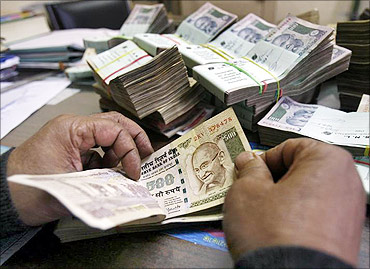
Markets may take comfort from the available cash balances though.
Miscellaneous: The new implementation date of at least the Central GST is likely to be announced as April 2012.
Measures to promote the much-needed corporate bond market, like lowering the withholding tax, may be announced to fund infrastructure investments.
The individual tax-slabs and benefits like health and insurance premium as well as interest limit allowance on housing loan and investment limit under Section 80C may be lifted as relief from inflation.